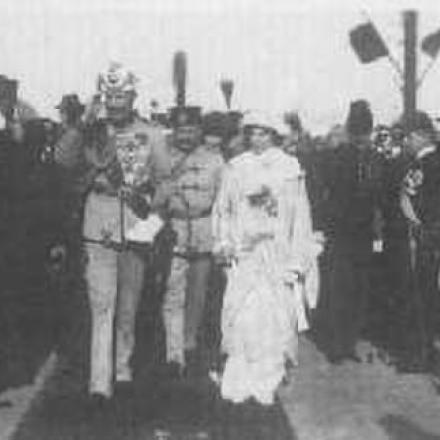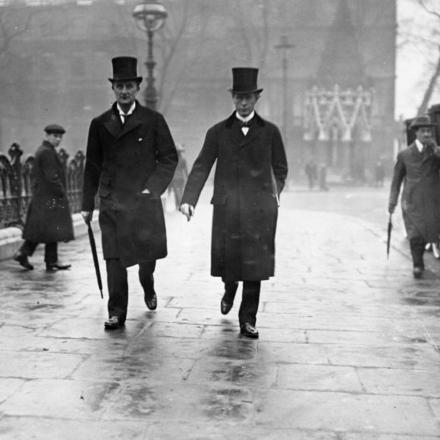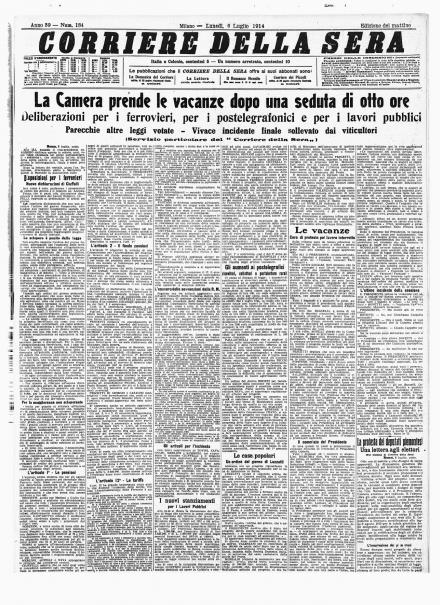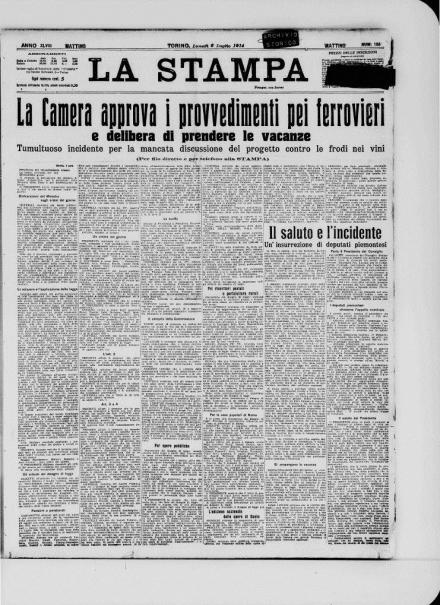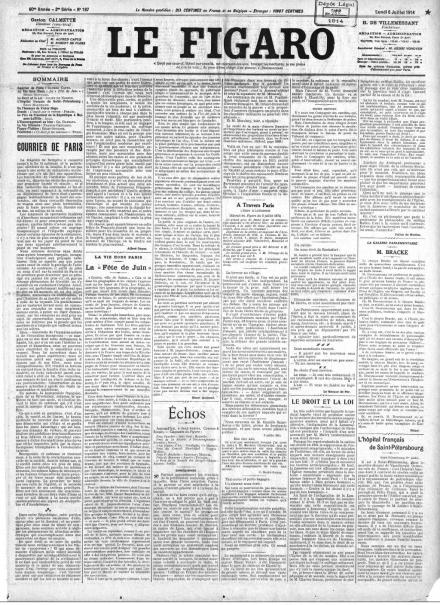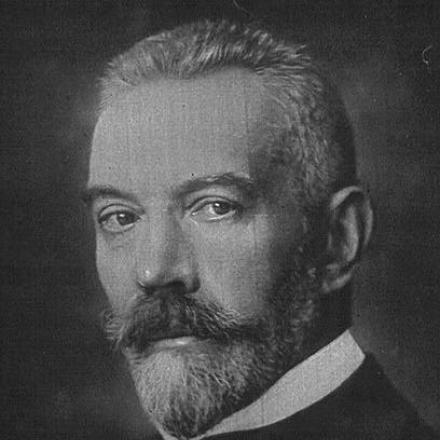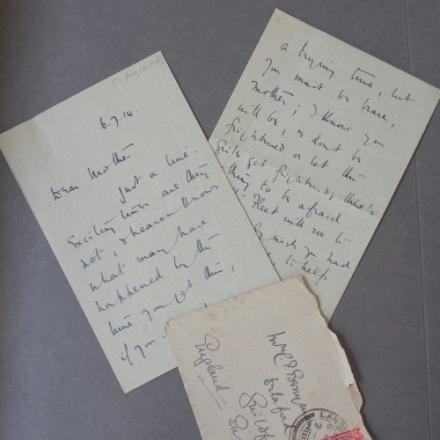Scongiurare un nuovo patto balcanico
Dopo due giorni di consultazioni tra i due alleati, un telegramma spedito lunedì 6 luglio ufficializza la posizione della Germania. Il mittente è il Cancelliere tedesco Theobald von Bethmann Hollweg, il destinatario è il suo Ambasciatore a Vienna.
Per metà sono semplici convenevoli, poi si arriva al sodo: Guglielmo II e il Governo confermano la validità della Triplice alleanza contro il «terrorismo russo e panslavo»; quindi accettano, loro malgrado, di discutere con la Bulgaria. È comprensibile, si deve scongiurare un nuovo patto balcanico e frenare le velleità rumene.
Da Berlino arriva anche un consiglio implicito: l’Impero austro-ungarico dovrebbe agire il prima possibile. Meglio mettere le altre Potenze europee di fronte al fatto compiuto. In questo modo la Germania spera di tenere localizzato il conflitto. Si muovono le pedine: l’inchiesta austriaca non rimedia prove contro il Governo di Belgrado, ma garantisce sulla complicità di alcuni ufficiali serbi nel complotto; l’Ambasciatore asburgico in Romania tenta di convincere i russi, tesi bocciata da San Pietroburgo; quello tedesco a Londra si lavora i britannici.
Ecco, ci sarebbe una domanda da porsi: siamo sicuri che gettare benzina nei Balcani sia una buona idea?
La regione è di per sé soggetta a improvvise e spontanee autocombustioni: già si combatte in Albania, dove il Principe di Wied è stato nominato da accordi internazionali dopo la rivoluzione e le guerre balcaniche: ci sono le solite tensioni religiose e regioni contese, come l’Epiro. In più ci sono le forti attriti anche tra Grecia e Impero ottomano. L’effetto domino è quasi garantito.
Davide Sartori
GLI AVVENIMENTI
Politica e società
- Il Kaiser Guglielmo II parte per una crociera nel Mare del Nord, convinto che né la Francia, né la Russia avrebbero agito.
- Per Bethmann-Hollweg, Cancelliere tedesco, l'Austria può essere sicura che il Kaiser sarà al suo fianco in conformità con gli obblighi derivanti dai trattati e per la vecchia amicizia.
- L'Ambasciatore tedesco Karl Max Lichnowsky informa Sir Edward Grey, Ministro degli esteri inglese, che la crisi sarebbe grave perché l'Austria, con il sostegno tedesco, avrebbe intenzione di agire contro la Serbia.
- L'Ambasciatore austriaco in Romania Czernin suggerisce al Ministro degli esteri russo Sazonov che gli istigatori del complotto contro Franz Ferdinand debbano essere cercati in Serbia, ma la tesi viene respinta.
- L'inchiesta austriaca rivela che il complotto è stato ordito nella capitale serba Belgrado, e vede coinvolti un impiegato serbo di uno dei Ministeri e alcuni ufficiali dell'esercito. Non ci sono prove che il Governo serbo sia implicato nel complotto.
Parole d'epoca
Theobald von Bethmann Hollweg
Cancelliere tedesco
Telegramma all'Ambasciatore tedesco a Vienna Tschirschky
Berlin, July 6, 1914
Confidential. For Your Excellency's personal information and guidance
The Austro-Hungarian Ambassador yesterday delivered to the Emperor a confidential personal letter from the Emperor Francis Joseph, which depicts the present situation from the Austro-Hungarian point of view, and describes the measures which Vienna has in view. A copy is now being forwarded to Your Excellency.
I replied to Count Szögyény today on behalf of His Majesty that His Majesty sends his thanks to the Emperor Francis Joseph for his letter and would soon answer it personally. In the meantime His Majesty desires to say that he is not blind to the danger which threatens Austria-Hungary and thus the Triple Alliance as a result of the Russian and Serbian Pan-Slavic agitation.
Even though His Majesty is known to feel no unqualified confidence in Bulgaria and her ruler, and naturally inclines more to ward our old ally Rumania and her Hohenzollern prince, yet he quite understands that the Emperor Francis Joseph, in view of the attitude of Rumania and of the danger of a new Balkan alliance aimed directly at the Danube Monarchy, is anxious to bring about an understanding between Bulgaria and the Triple alliance [...]. His Majesty will, further more, make an effort at Bucharest, according to the wishes of the Emperor Francis Joseph, to influence King Carol to the fulfilment of the duties of his alliance, to the renunciation of Serbia, and to the suppression of the Rumanian agitations directed against Austria-Hungary.
Finally, as far as concerns Serbia, His Majesty, of course, cannot interfere in the dispute now going on between Austria-Hungary and that country, as it is a matter not within his competence. The Emperor Francis Joseph may, however, rest assured that His Majesty will faithfully stand by Austria-Hungary, as is required by the obligations of his alliance and of his ancient friendship.
BETHMANN-HOLLWEG
Parole d'epoca
Ted
Lettera alla madre
Dear Mother
Just a line- Exciting times are they not, & heaven knows what may have happened by the time you get this, if you ever do. But you must’nt mind mother; I know the state of mind you must be in. Dont be frightened. War is a horrible thing & this was bound to come, & the sooner the better. It could’nt have come at a better time for England, & you need have no fear at home, you wont be troubled there.
And of course you are proud of having a son in the navy who is a member of the finest Service the world has ever seen, and whatever else you must be glad that he’s to have a chance of doing his duty & distinguishing himself. So dont be anxious; rather consider him lucky to get his chance; & I know Paul will play the game when it comes to the real thing.
I feel very out of it here; you can quite understand my anxiety as a soldier to be where the show is, but I dont see much chance. They may call on the Indian army for help, but I dont know what they are going to do. Anyhow I repeat I do feel most awfully not being on the spot, & I envy those who are getting their chance at last. I fully realise somebody has got to stay behind, & look after England, India, Egypt, & the rest of them, but it galls just the same, I would give anything to have a look in in this war.
I’m afraid we are all going to go through a trying time, but you must be brave, mother; I know you will be, &. dont be frightened or let the girls get frightened, there’s nothing to be afraid of; the Fleet will see to that. I only wish you had a son at home to help you through it all.
Best love to all & wish your service sons the best of luck,
Yr loving son
Ted
